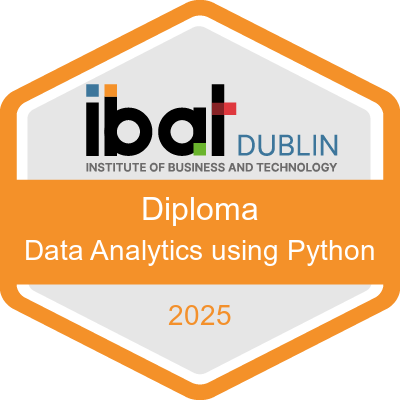- Why Python?
- Course Overview
- Career Opportunities
- Entry Requirements
Why Python?
Python has become one of the most useful and widely used programming languages by both software developers and data scientists. Its accessibility makes it a popular choice for those who want to learn how to code. It reads almost like plain English and has many features that allow you to write complex tasks very simply.
By the end of this course, students will have:
- A fundamental understanding of programming and the different techniques and languages used for programming
- A firm foundation in procedural programming using Python
- A fundamental understanding of Python Object Orientated Programming.
- Knowledge of how to integrate AI into Python development.
- An understanding of the major libraries used for data analysis: NumPy, Pandas, Matplotlib, Seaborn.
- Practical knowledge of how to import, filter, manipulate, and save data to CSV files.
- The ability to use the relevant tools to output data in tabular and graphical format.
- The ability to recognise the power of Jupyter Notebooks to carry out, report, and demonstrate sophisticated and complex data analysis.
According to the TIOBE Index, Python is currently the most popular programming language in 2024. Demand for Python experts in the Irish IT sector is at an all-time high, with forecasts for strong growth in 2024.
Course Overview
Students will use Jupyter Notebooks to get a hands-on study experience. They will be required to practice programming for themselves during lectures outside of the classroom. Students should commit to at least five hours of learning outside of class time each week. Due to the interactive nature of these classes, the number of students is limited.
What you will learn:
This data analytics with python course is perfect for those who may feel a little overwhelmed and want a simple, clear place to start their programming journey. It has been designed for those with little or no previous experience in the area who want to feel confident in their ability to write code. It’s ideal for any learner with an interest in and the motivation to embark on a career in software development.
This course will allow you to go from a complete beginner to having a solid understanding of the Python programming language.
You’ll begin by completing basic exercises that focus on the core concepts of programming. As you progress, you’ll learn how to use variables to store, retrieve, and calculate information. You will then move on to conditional execution, iteration, and many other functions, lists, list processing, object custom types, and handling exceptions
Course Content
At the end of this course students will have:
- A fundamental understanding of programming and the different techniques and languages used for programming
- A firm base in procedural programming using Python
- A fundamental understanding of Python Object Orientated Programming
- Learn how to integrate AI into Python development by leveraging ChatGPT as a learning tool and an assistant when programming
- A sound knowledge of the major libraries used for data analysis, [NumPy, Pandas, Matplotlib, Seaborn]
- Practical knowledge of how to import, filter, manipulate, and save data to CSV files.
- Ability to use the relevant tools to output data in tabular and graphical format
- The ability to recognise the power of Jupyter Notebooks to carry out, report, and demonstrate sophisticated and complex data analysis.
What is a Professional Diploma?
An IBAT Professional Diploma is a focused, short-duration practical course that consolidates, upskills and/or reskills learners in a professional area. It is a stand-alone qualification that does not lead to an award on the National Framework of Qualifications (NFQ).
Career Opportunities
Python programmes can be developed quickly, which means developers are always in high demand. Organisations are often seeking Python experts as they can reduce project time, which is a huge benefit to all development projects. Data scientists and analysts also regularly use Python meaning there are job opportunities across the industry.
Possible careers within this field include:
Data Scientist
Data Analyst
Python Developer
Financial Advisor
Python is one of the most popular programming languages for building data analytics in fintech. According to GitHub Education, Python, HTML, and JavaScript are the three most popular coding languages among entry-level programmers.
Just last year, Indeed Statistics named Python as the number one top skill employers desire in 2024, followed by JavaScript, Java, and C.
Entry Requirements
This course has been designed for beginner programmers, so no previous working knowledge of programming is required. However, to ensure sufficient digital literacy, students should be familiar with core applications, such as word processing and spreadsheets, at the ECDL level or equivalent.
Why Study at IBAT Dublin?
We are Ireland’s leading enterprise-focused third level institution with a special focus on how we guide, support, and mentor our students throughout their college experience and into their working lives.
We know that employers need graduates that can hit the ground running, so we’ve tailored our courses to prepare you to do just that. And if you need an extra hand, our Academic team equipped with years of lecturing and industry experience are ready to support you both in your professional and personal development.
Diverse Programmes
Take your pick of our wide range of courses, each designed with your future in mind.
Expert Tutors
Learn from industry professionals at the very top of their game.
Flexible Learning
Life happens. We get it. Study and achieve your goals on your schedule.
Central Location
Study at one of our two campuses placed in the heart of central Dublin.
Small Class Sizes
Get one-to-one, personalised support from our tutors.

Student Testimonial
Listen as students share their reasons for choosing to study at IBAT Dublin and the benefits they’ve gained from their experience.
Study options
You can attend lectures Online or On Campus, offering maximum flexibility with your time and how you learn.
Online Study
On Campus Study
Digital Certification
A Digital Certificate will be issued upon successful completion of an in-class exam for each of the two modules, in addition, you will also receive a Digital Badge.
What is a Digital Badge?
A micro-credential is a compact credential that verifies the achievement of a skill or knowledge gained. A Digital Badge is a visual representation of having earned a micro-credential which can be shared on various online platforms to showcase the earner’s achievement.
Why have a Digital Badge?
Your Digital Badge and Certificate can be shared on social media channels such as LinkedIn and Facebook. Digital Badges can also be added to email signatures, displayed on resumes or added to recognised achievement platforms such as Badgr, Credly and OpenBadges. These are a great way to communicate your knowledge and skills, and highlight your commitment to Continuing Professional Development (CPD).









